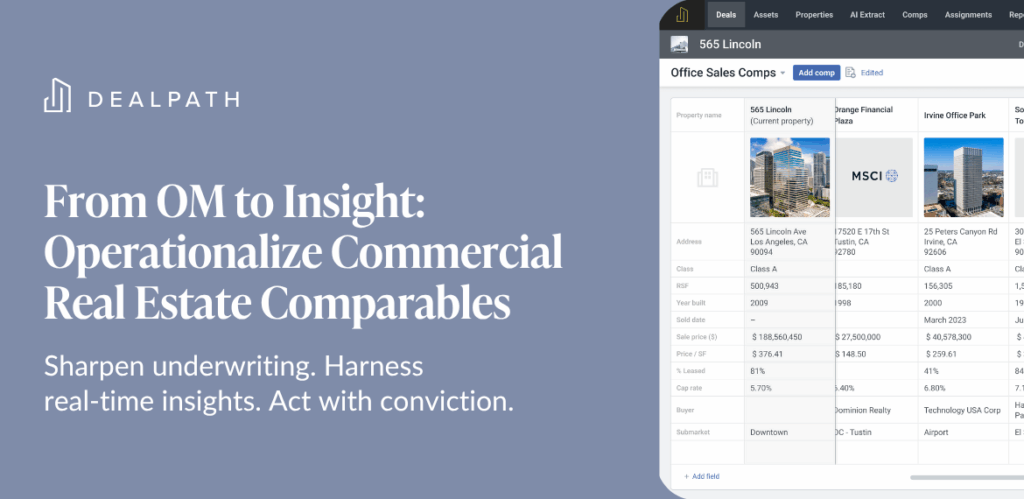Balancing repetitive weekly tasks with urgent, ad-hoc requests from leadership leaves real estate deal teams with minimal time to tackle strategic priorities. At the end of the day, the most important thing is that your pipeline is on track and leadership, whether that means the VP of Acquisitions or Managing Director, can see deals are flowing.
As the industry continues to undergo a digital transformation, it begs the question: is that really the most important thing? What would you do if you had an extra ten hours per week to prioritize analytical work? Or, to pursue strategic initiatives that are otherwise sidelined by manual work and urgent requests?
The Deal Management Paradigm Shift: Building Tech-Enabled Efficiencies
According to a 2022 survey, 48% of CRE CFOs expected tech budgets to increase in 2023.
Invented in 1985, Excel has historically functioned as a catch-all tool in the tech-averse and change-resistant CRE industry. While it remains the tool of choice for modeling, cloud-based databases and project management tools created by world-class Silicon Valley companies are now table stakes for investment professionals.
As purpose-built software solutions increasingly become the norm for CRE firms, industry leaders of all sizes and strategies look to deal management software as a way to both eliminate manual work and act more strategically, at every level.
From real-time pipeline information, to deal documents, transaction workflows and proprietary data analytics, deal management software has become the institutional investors’ command center. Centralizing this information has eliminated much of the manual work that, previously, took a toll on all professionals, from analysts through CIOs. Leveraging data they can trust, these firms can more nimbly outperform the competition at scale.
Deal teams that continue to expend limited resources on manual report-building and intelligence-gathering risk falling behind tech-enabled competitors. In turn, these stone-age firms could forfeit lucrative deals, close deals at a slower pace, or even miss out on fundraising opportunities.
Eliminate Manual Work with Centralized Institutional Knowledge
Throughout the corporate ladder and the deal lifecycle, deal management platforms like Dealpath offer the intelligence and efficiency needed to make strategy a top priority–instead of information-gathering and manual inputs.
For example, as you ingest deals and add underwriting models, due diligence documents, on-site photos and more in Dealpath, you’re laying the foundation for deal collateral. When it comes time to create an Investment Committee memo, or a DD finding report, you can simply output a document meeting institutional requirements. Where you might have previously entered information 15 different times, you can build efficiencies and create clarity in one source of truth.
Consider, in another example, the time required for an analyst to find an underwriting model from a 6-month-old Chicago industrial deal to apply the same rent growth and operating expense assumptions.
What if the analysts on your team could validate your conservative bias by surfacing that model instantly, or report on 12-month averages? Or, pull market comparables from all deals reviewed in the last two years to support your investment thesis when the Managing Director presents the deal to the Investment Committee?
How would you reallocate that time to sharpen future analyses with data at your fingertips?
Slice and Dice Data to Build Relationships and Fuel Negotiations
Building a proprietary deal database with every new deal you review (and reject) memorializes intelligence, making data your competitive advantage. As you win back your time and bandwidth, data at your fingertips can also fuel negotiations and relationship-building.
Think about the leverage you could gain when negotiating with a new broker by showing the sheer volume of deals a competitor sources for you. Alternatively, consider how a VP of Acquisitions might negotiate PSA terms to mitigate risk. Rather than sifting through files to find preferred language in “that lease”, they can instantly surface any deal information–even within PDFs–utilizing Power Search in Dealpath.
Swift, strategic negotiations can prove invaluable in accelerating late-stage deal flow, particularly when senior management is eager to close.
Reporting in Dealpath can also open new doors when currying favor with investors. Say that your firm, for example, has recently broken into the Texas multifamily market at the request of sponsors, who are now eager to view a report. Tracking every deal you’ve ever reviewed, a deal management platform like Dealpath eliminates the need to manually compile this information, instead outputting a clean, easily digestible report proving your success.
Saving the time you might’ve spent analyzing this data means you can instead spend that time by, for example, visiting that sponsor to discuss future funding.
Prioritize Work Nimbly and Supercharge Headcount Efficiency
It happens to all deal teams: you’re in the late stages of the best deal you’ve seen in months, and the lead analyst is out sick. Circumstances like these can leave deal teams scrambling to search for institutional knowledge to extinguish fires; but what if the latest updates were visible in real time?
Pivoting from spreadsheets or one-trick-pony solutions to real-time deal management also creates unprecedented accountability, helping teams more effectively allocate resources. If a team member calls out, then a manager can simply run a staffing workload report to see who is handling each deal, then re-prioritize accordingly. Consequently, you can also eliminate time-consuming staffing meetings and burdensome prep work.
Finally, visualizing this information can also help surface process gaps and bottlenecks, like the need for a transaction manager or an additional step in diligence. Real-time visibility into the latest updates supercharges headcount efficiency, whether you’re leading a 5- or 50-person deal team.
Training Homegrown Talent: Make Everyone a Dealmaker with Dealpath
From accelerating onboarding with standardized task checklists to supercharging evaluations with real-time analytics, Dealpath helps team members at all levels build the efficiencies necessary to adopt a more strategic lens. All the while, you can offer superior career development opportunities with best-in-class technology. Whether you choose to spend that time evaluating even more deals, taking a deeper look at your pipeline or even golfing on Friday, you can outperform the competition with a data-driven strategy and world-class execution.
To learn more about how firms of all sizes are weathering a volatile market and pivoting to emerging opportunities, watch our on-demand webinar.
Watch Now



